Are You Using Cognitive Biases? | PersonalityHacker.com
TAKE THE FREE PERSONALITY TEST: https://personalityhacker.com/genius-personality-test
Get The Personality Hacker Book: https://amzn.to/37JMJVf
In this episode Joel and Antonia point out the cognitive biases we all tend to use and offer alternatives to them.
IN THIS PODCAST:
Cognitive Biases happens in our minds because we have these programs or scripts from ancient wiring. These wirings in our heads existed so long ago.
These scripts result in multiple cognitive biases and these can be harmful.
How can these scripts mess us up or help us? Why do they exist?
When a person’s subjective perspective or social experience overrides the objective data, it generates an irrational or illogical conclusion.
These scripts that you are running are processes that are replicable.
Our brains naturally work so that once we figure out a way to do something, our brains acknowledges the strategies we’ve implemented as effective strategies.
On a biological level, our brains are creating mental super highways and protects it with a layer of fat. For example, when we drive our way to work, we don’t need as much focus or concentration as before. We can listen to some music and still be able to arrive at our destination.
On a subconscious level, our brains have already created these systems many years ago. There are scripts that we inherit biologically. Some of these scripts put more emphasis on different people like our family members compared to strangers.
Example: if our child is in peril and a stranger is in peril, our minds tell us to save our child instead of the stranger.
Cognitive biases are universal and this isn’t something that we can get away from. Everyone is doing it all the time.
Language, in a substantial way, create cognitive biases.
The more aware we are of these biases, the more we understand what’s going on with the situation.
Example, the belief that you’re the only ones with the truth, wherein you’re the only one who knows how the world operates and that others are wrong.
One of the most common type of bias is the confirmation bias. This is when you look for more information in order to support your belief.
Another example of a cognitive bias is if an argument has internal and logical consistency, we tend to think that it’s true. There are a lot of biases that move us out of the premise and let us divulge on details.
Pretty much everything that comes in our life is subjective experience because that’s all we know.
Depending on where you are at life and the level of your personal growth, you will have different sorts of cognitive biases. Here are more examples:
Stereotyping. Seeing a certain group of people as having unified action and intent.
The availability heuristic. The tendency to overestimate the likelihood of an event from the past based on how recent it was or how emotionally evocative it was for us.
Information bias. The tendency to seek information even when it cannot effect action.
Sunk cost fallacy. “I put so much in, I can’t disconnect now”. This is where you put much money, time and effort into something that didn’t work out well. You feel that it’s hard to let go of it and you think maybe soon, you will see the results you want.
Pareidolia fallacy. This a psychological phenomenon involving a stimulus which is perceived as significant. People see things that aren’t there but it creates a belief system on them.
If we look at cognitive biases as tools to lead us to what we truly desire, the cognitive biases that we’ve employed are leading us to the ultimate desires of our hearts. We may say that we want happiness, but we have cognitive biases that prevent us from achieving happiness.
It’s not about changing the biases we have, it’s really about changing and examining what it is that we truly desire at the core level that will impact the biases that we use as strategies.
The true desire of our heart is to be right in some way.
Example: If the piece of information has contradicted to what I believe was true, I would resist looking at that information because of the bias that it had. This removes other possibilities that could shed deeper understanding of the truth.
You can use cognitive biases to get what you want.
Manifesting is a tool that is built from cognitive bias yet people implement manifesting to basically get what they want.
Manifesting is an entire discipline around the cognitive bias that help people consciously get what they consciously want.
When people address themselves are pessimists, optimists or realists, these are all cognitive biases.
No matter what our biases are, it’s more about looking at them as tools and not just looking at it as a fixed stand point but as tools for navigating space and life and throwing out everything that doesn’t help you. It’s about taking control of your life and not living through autopilot.
#PersonalityTypes #MBTI #MyersBriggs #PersonalGrowth #SelfHelp #Podcast
-
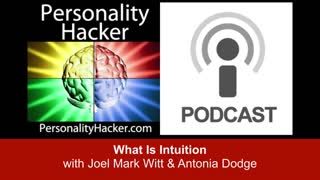 42:53
42:53
Personality Hacker
1 year agoWhat Is Intuition? | PersonalityHacker.com
27 -
 38:29
38:29
Personality Hacker
1 year agoCan You Trust Personality Typology Systems | PersonalityHacker.com
16 -
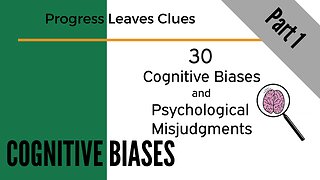 24:42
24:42
Progress Leaves Clues
10 months ago30 cognitive biases & psychological misjudgments - part 1 (Do YOU Know thyself?)
27 -
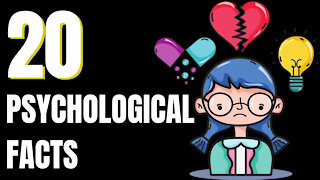 9:45
9:45
How To Become Better Person.
3 years ago20 Psychological Facts That Will Blow Your Mind | psychology facts about personality
170 -
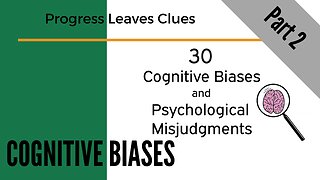 27:58
27:58
Progress Leaves Clues
10 months ago30 cognitive biases & psychological misjudgments + - (Do YOU Know thyself?)
9 -
 4:30
4:30
The Krehbiel Group - Something I Learned Yesterday
11 months agoAn introduction to cognitive biases
18 -
 7:13
7:13
bulletproofcashflow
3 years ago $0.01 earned3 Cognitive Biases That Will Make You Lose Deals! (MUST SEE)
108 -
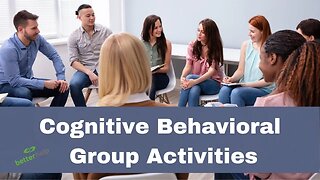 1:01:04
1:01:04
DocSnipes
3 years agoCognitive Behavioral Therapy Group Activities | CBT Therapist Aid
27 -
 0:10
0:10
believeyourself173
1 year agoFascinating Psychological Facts You Didn't Know | #fact | #psychology
73 -
![How To Talk To People - Candles In The Dark: Session 1-5 [Psychology]](https://hugh.cdn.rumble.cloud/s/s8/1/8/a/l/B/8alBj.0kob-small-How-To-Wake-Up-Brainwashed-.jpg) 4:01:32
4:01:32
Keep An Open Mind
1 year agoHow To Talk To People - Candles In The Dark: Session 1-5 [Psychology]
261